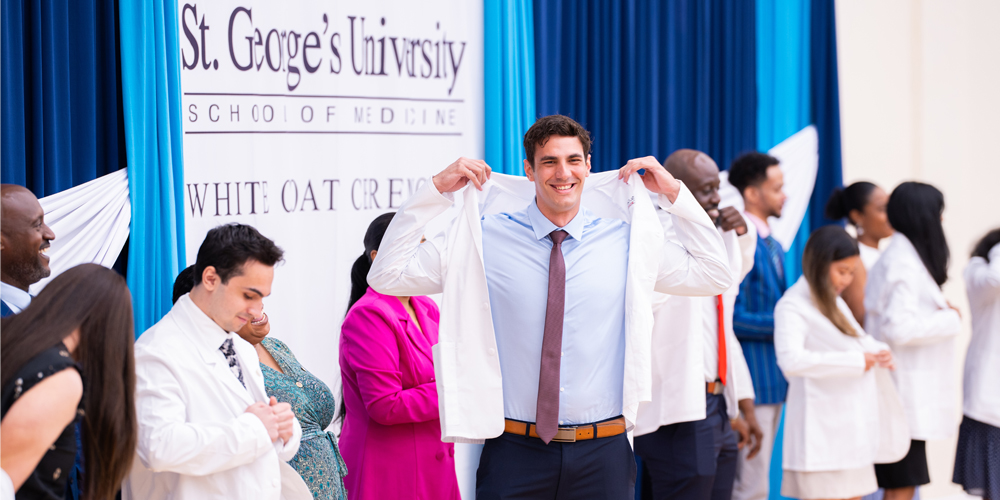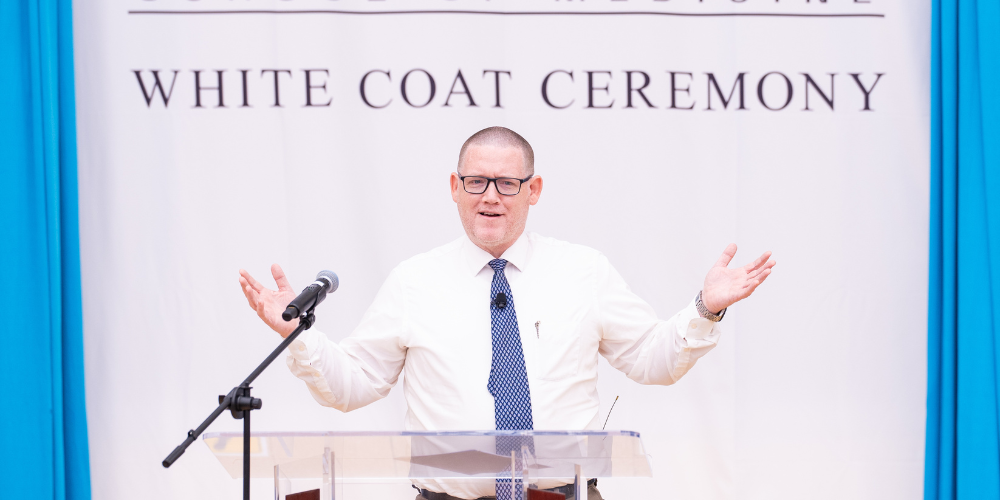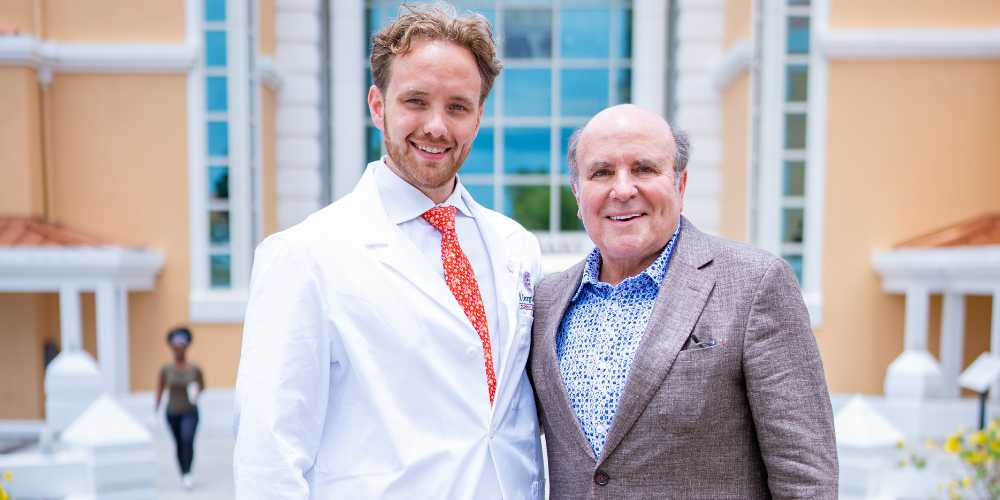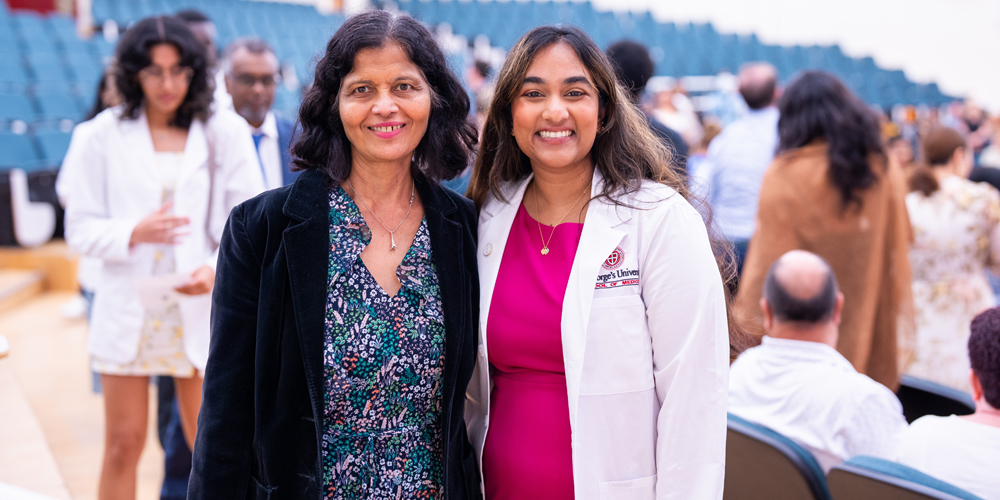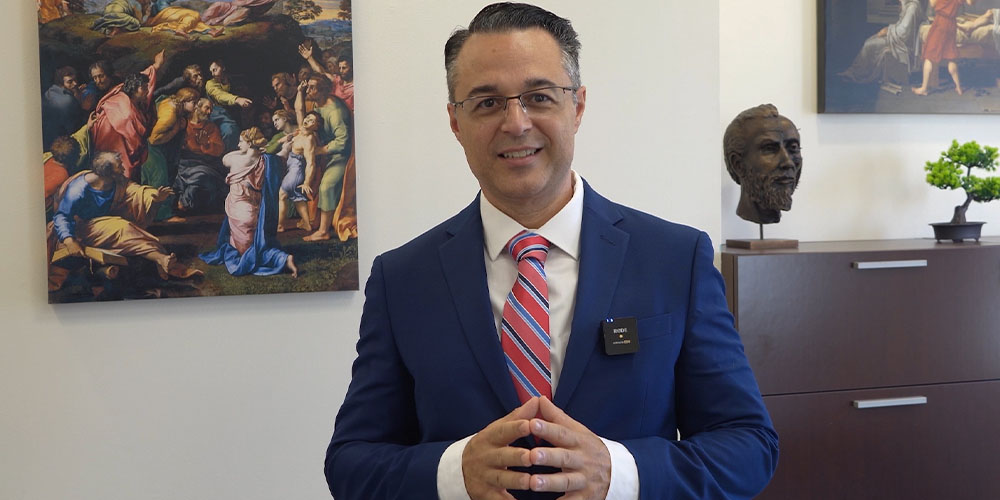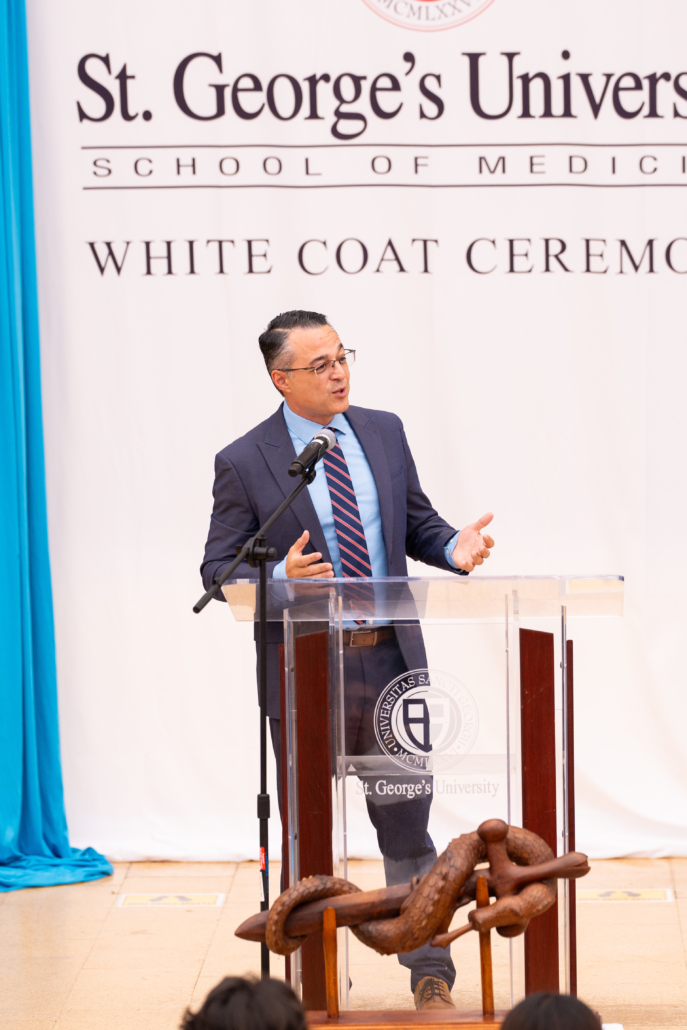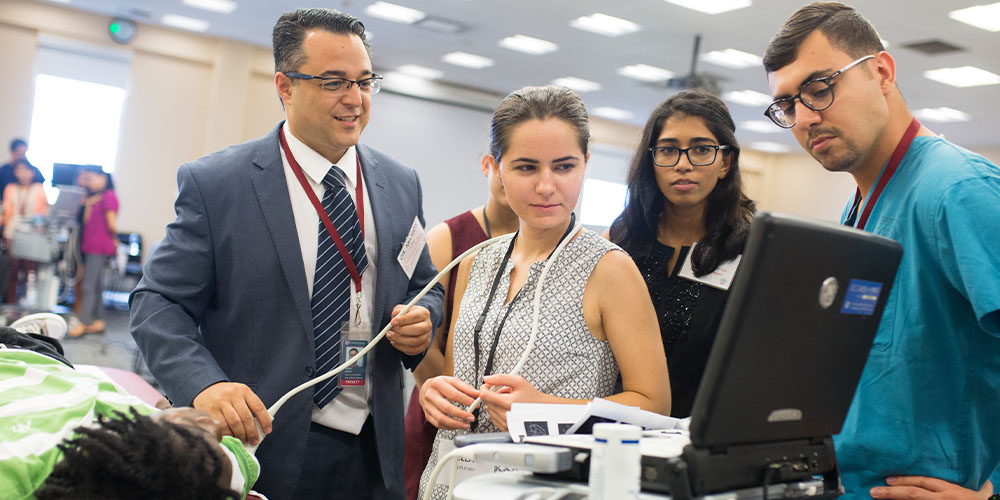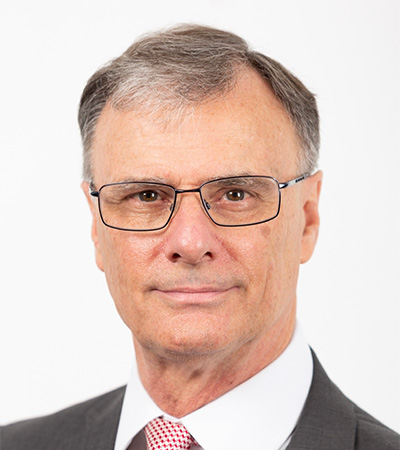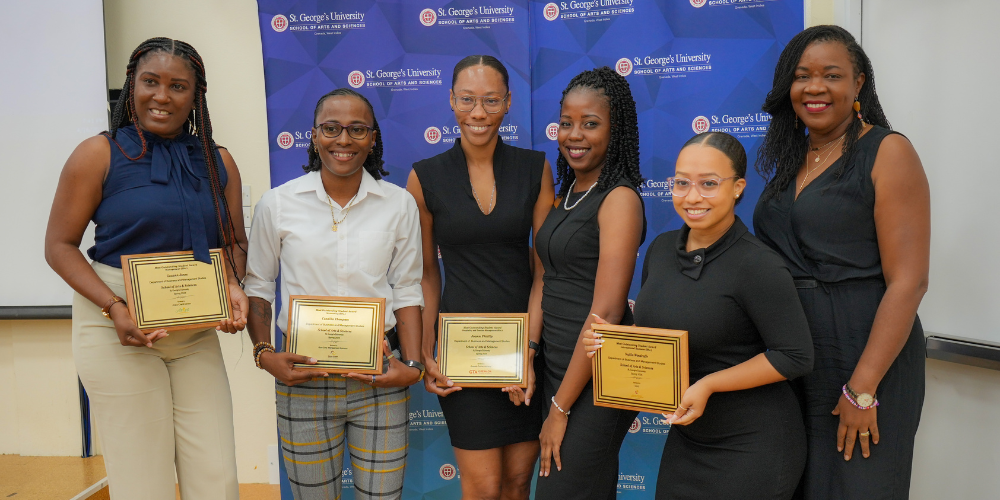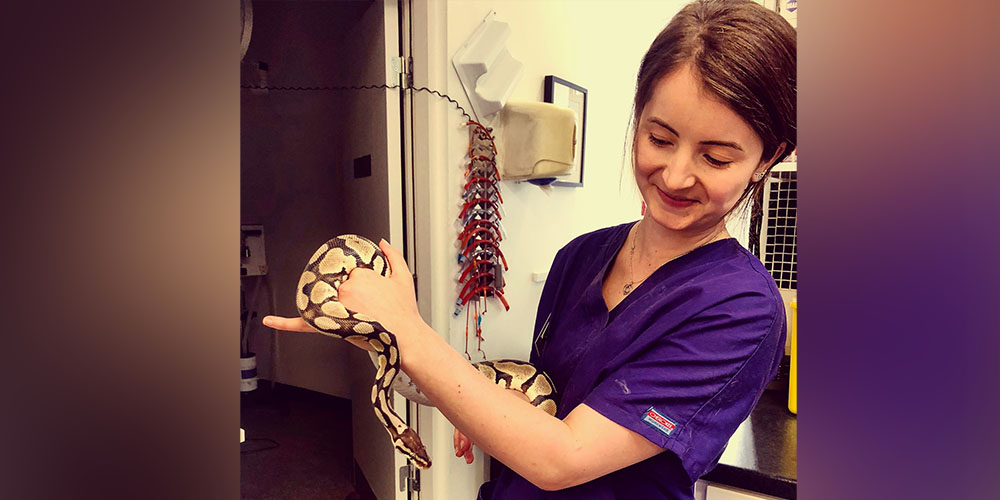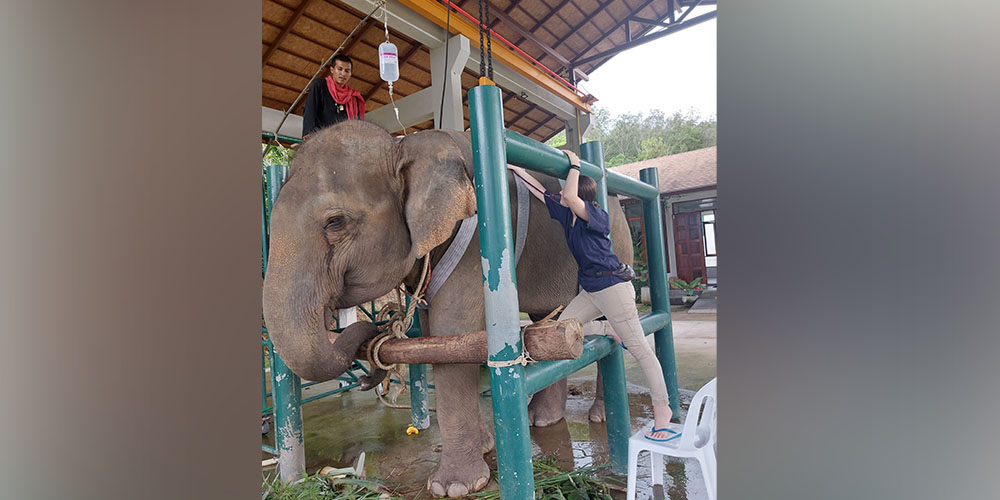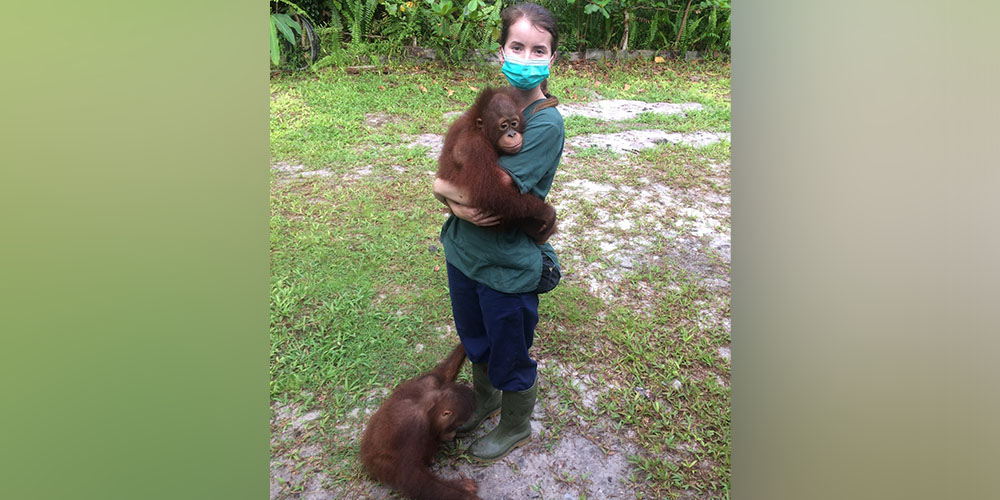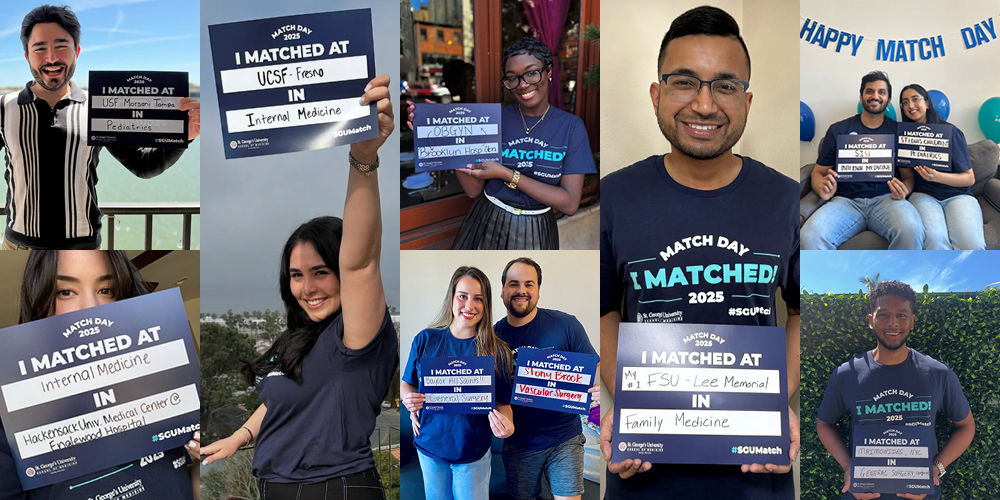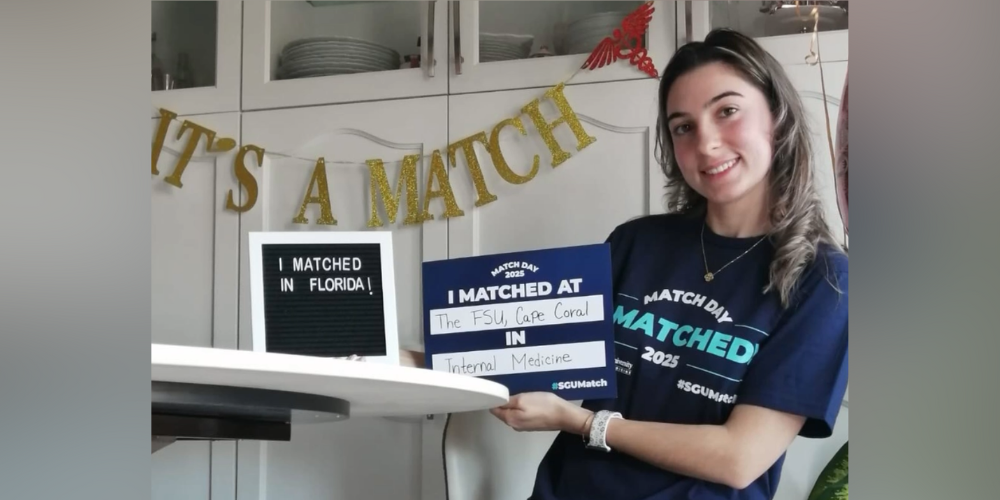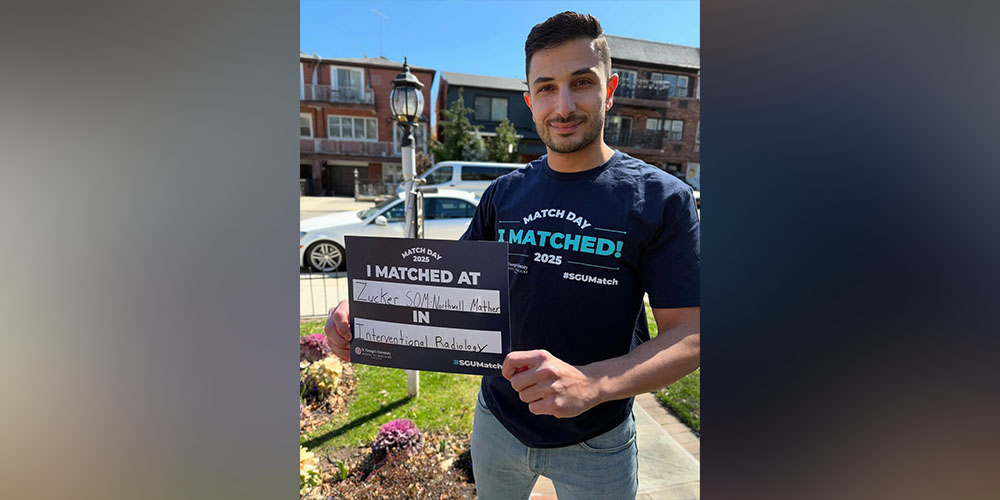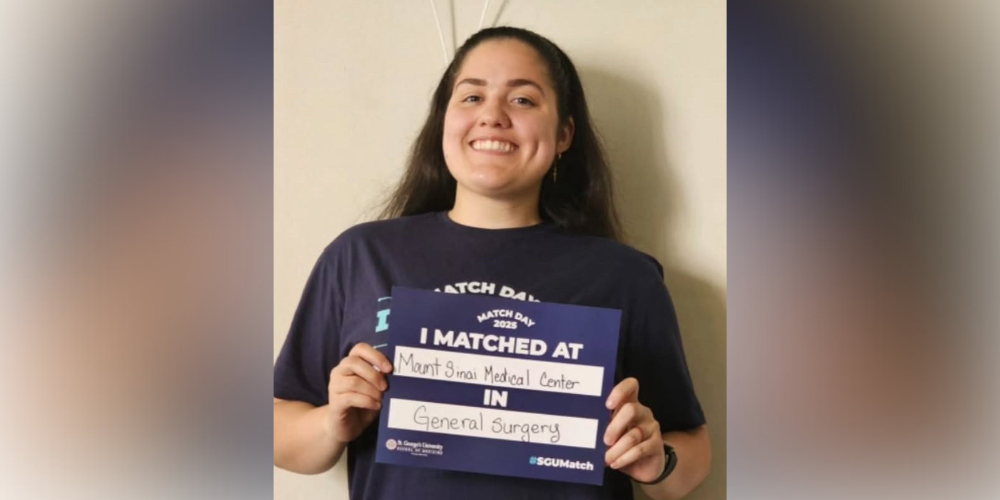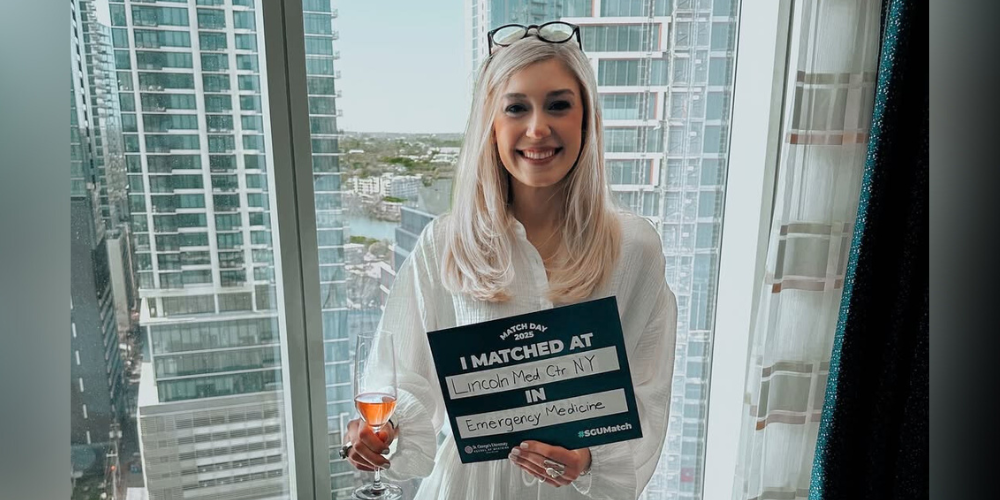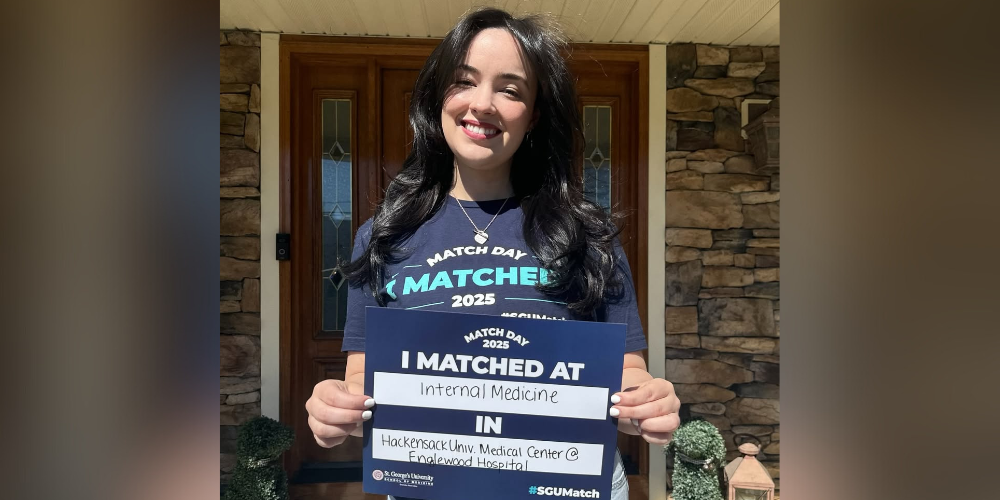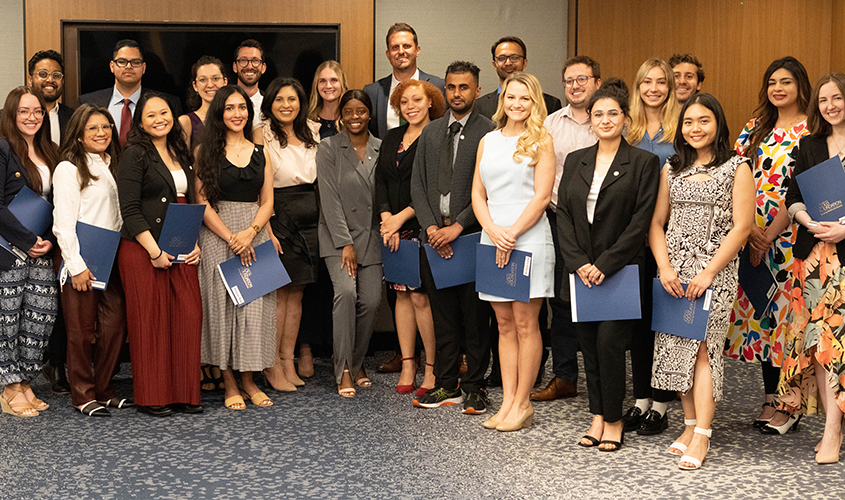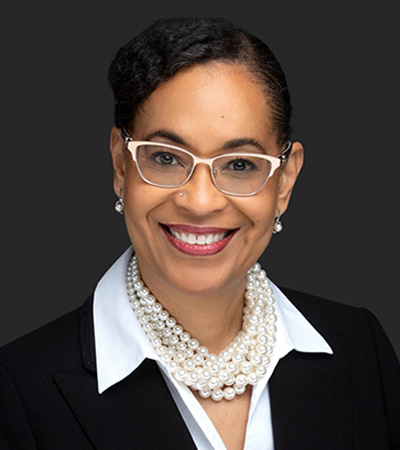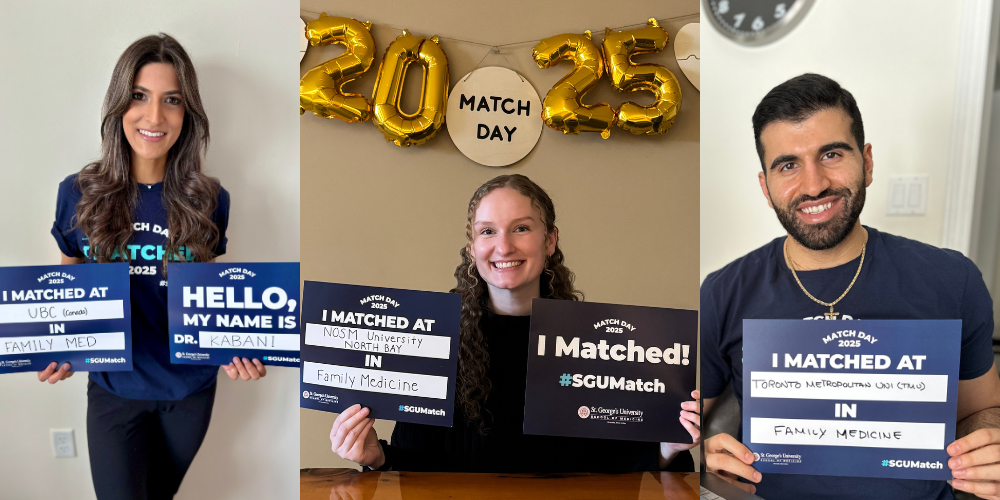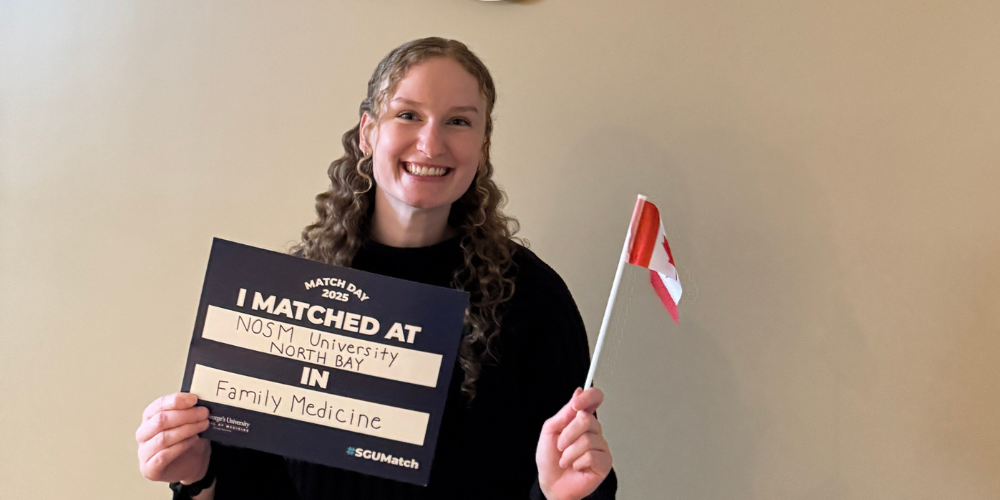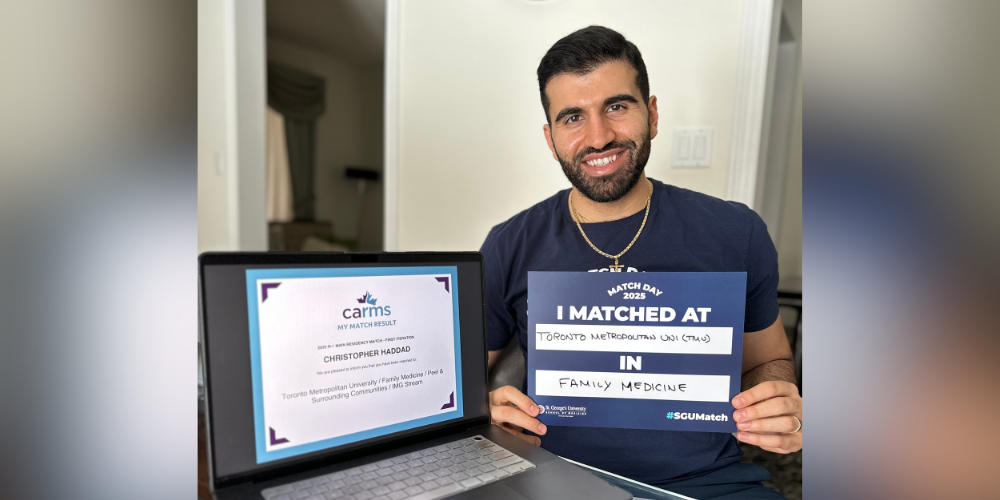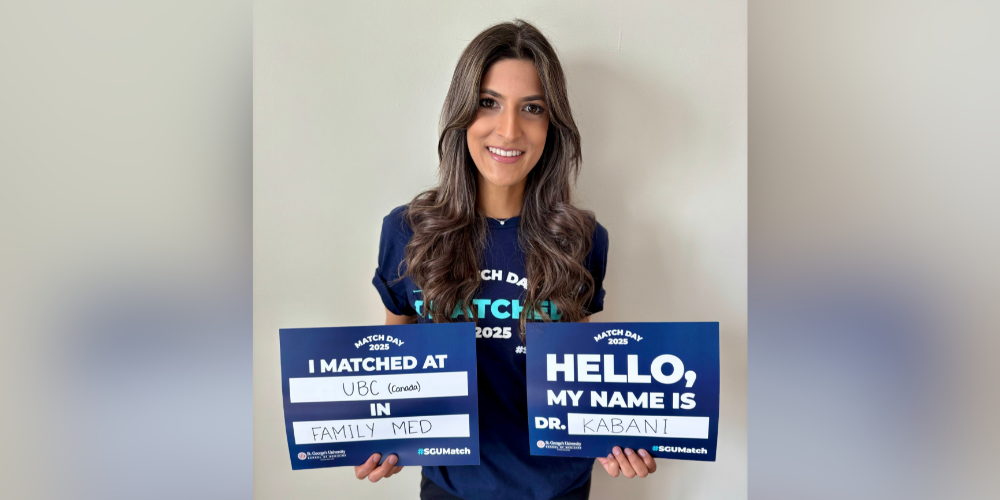SVM Term Awards and Phi Zeta Induction Ceremony Celebrate Dedication and Achievement
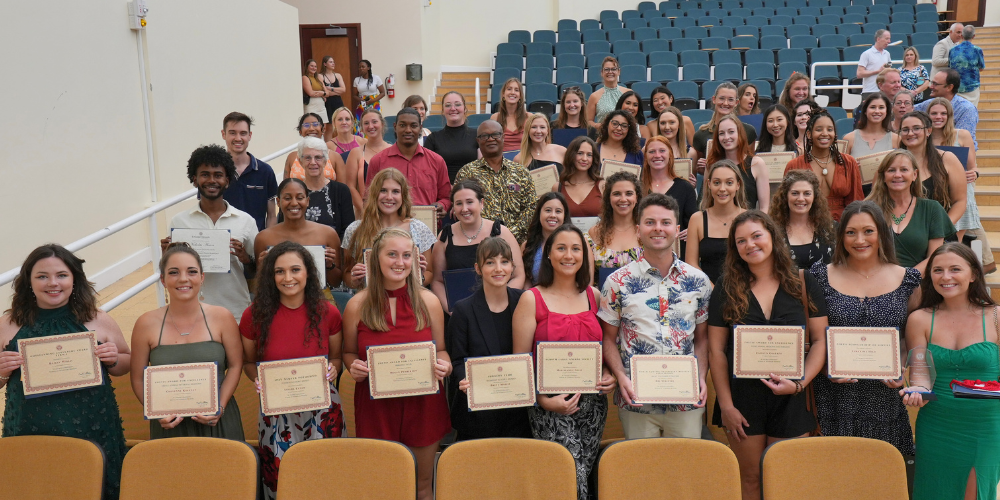
The St. George’s University (SGU) School of Veterinary Medicine celebrated excellence, leadership, and academic achievement at two hallmark events this past April: the Spring 2025 SVM Term Awards Ceremony and the Phi Zeta Honor Society Induction. Both gatherings honored the dedication and accomplishments of students, faculty, and staff across the SVM community.
“It never ceases to amaze how much talent and excellence exist within our SGU SVM community,” said Tara Paterson, DVM ’03, chair of the SVM Awards Committee. “Congratulations to all our award winners and nominees.”
Thirty-seven sets of awards were presented to more than 70 students, faculty, and staff during the SVM Term Awards, which took place on April 17.
After thanking her colleagues on the SVM Awards Committee and SVM Dean’s Office staff, Dr. Paterson bid a bittersweet goodbye to the SVM term six class and wished them well as they enter their clinical year.
On April 25, the Alpha Delta Chapter of the Society of Phi Zeta welcomed 41 new inductees—17 from Term 5 and 24 from Term 6. Phi Zeta is the national veterinary honor society created to recognize students for their superior academic achievement, and it is headed by assistant professor Dr. Kerri Nigito as president and clinical faculty member, assistant professor Dr. Sophie Moittie as vice-president, and head technician Keshia John as treasurer and secretary.
“These events highlight the remarkable depth of talent and commitment among our students, faculty, and staff,” said Dr. Neil Olson, dean of SVM. “Recognizing their accomplishments reflects the collective spirit of excellence that defines the SGU School of Veterinary Medicine. Congratulations to the award winners and inductees.”
This semester’s awards are as follows:
Outstanding Colleague Awards
Term 1: Bailey Willis and Michaela Bird
Term 2: Sydney Stephens
Term 3: Cassandra Mata
Term 4: Chelsea Paclibar and Luke Griffin
Term 5: Shelby Richter
Term 6: Daphne Harris
Dean Olson’s Award for Academic Excellence
Daphne Harris
Adrienne Lotton Memorial Award
Daphne Harris
Zoetis Revolution Awards of Excellence
Small Animal Internal Medicine: Cheyenne Koinzan
Small Animal Surgery: Alyson Lillibridge
Equine Medicine and Surgery: Courtney Griffin
Food Animal Medicine and Surgery: Caitlyn Collazo
Scholarship of Service: Samantha Hild
Surgery Team: Meagan Baroniel, Megan Pemberton, Evia Russell and Riley Wildfeuer
Excellence in Student Research: Shelley Lownds
Dr. Jim Nave Award for Excellence in Clinical Practice
Maria Escanellas Juan
Giant Paws Giant Hearts Foundation “Hercules” Award
Eloise Verret
Dr. Ravindra Nath Sharma Pathology Excellence Award
Magali Duran
The Veterinary Professionalism Award
Daphne Harris
PAWS Recognition Sixth Term Facilitators
Elizannette Bonet, David Dominguez, Maria Elena Escanellas, Samantha Forjan, Courtney Griffin, Daphne Harris, Dajuan Hinton, Ishan Jhamb, Benjamin Liu, Mikka Muramatsu, Alejandra Pardo, Shelby Pardoe, Elana Raaphorst, Abby Ramlagan, and Elizabeth Williams
Student Chapter of the American Veterinary Medical Association (SAVMA) Executive Board Extraordinary Service Award
Macie Brand
Feral Cat Project
A-meow-zing member: Karen Liang
Cat-tastic faculty: Dr. Elizaveta Vasechkina, instructor, Small Animal Clinic
Veterinary Public Health Committee
One Health One Medicine Community Leader Award: Eloise Verret
One Health One Medicine Community Faculty Excellence Award: Quacy Matthew
SGUSVM Large Animal Society
Large Animal Society MVP: Marialaura Gigli
Watchful Shepherd Award: Dr. Heidi Janicke, professor, Large Animal Medicine and Surgery
Student Chapter of the Society for Theriogenology
Tango Award: Erika Mackenzie
Two To Tango Award: Dr. Afroza Khanam, assistant professor, Large Animal Medicine and Surgery
Wellness Aide and Guidance (WAG)
The Praiseworthy Pothound Award: Hanna Holden
Angels in Armor Animal Rescue Fund (AAARF)
AAARF’s Angel Award: Hayoung (Katie) Kim
AAARF’s Armor Award: Dr. Britain Tully, assistant professor, Small Animal Clinic
Veterinary Anesthesia Club (VAC)
No Pain All Gain Award: Emily Guy
Sedation Sensation Award: Dr. Sophie Moittie, assistant professor, Pathobiology
Veterinary Dermatology Society (VDS)
(New) Mange Squeeze Award: Nicole Land
(New) Itching to Help Award: Errol Pysadee
Pride and Equality (P&E)
Excellence in Diversity, Equity, & Inclusion (DEI), student: Gwendolyn Magana
Excellence in Diversity, Equity, & Inclusion (DEI), faculty: Dr. Taila Guttin, associate professor, Small Animal Medicine and Surgery
Student Chapter of the American College of Veterinary Internal Medicine (SCACVIM)
Most Dedicated Member: Caroline Tryfiates
Student Chapter of the Veterinary Emergency & Critical Care Society (SVECCS)
Most Involved Member: Amanda Hong
Most Influential Staff Member: Dr. Elizaveta Vasechkina, instructor, Small Animal Clinic
Student Chapter of the Association of Shelter Veterinarians (SCASV)
Shelter Scholar Award: Perryn Barnes
Students of the Canadian Veterinary Medical Association (SCVMA)
NAVLE Review Leader: Dr. Joanne Buckland, associate professor, Dean of Veterinary Medicine Office
Spay Neuter Pothound (SNP)
Student Pothound Hero Award: Leigha Lynch
Staff Pothound Hero Award: Quacy Matthews
Student Chapter of the American College of Veterinary Pathologists (SCACVP)
VIP (Very Important Pathologist): Hayley Wuestenberg
Creating A Path Award: Dr. Dawn Seddon, professor, Pathobiology
Exotics and Wildlife Society (EWS)
Wildlife Warrior Award: Beatrice Caouette
World Aquatic Veterinary Medicine Association (WAVMA)
MVP (Most Valuable Porpoise): Ari Streeter
Veterinary Business Management Association (VBMA)
VBMA Officer Recognition Award: Luke Griffin
VBMA Faculty Recognition Award: Dr. Adria I. Rodriguez, associate professor, Small Animal Medicine and Surgery
Animal Welfare and Behavior Committee (AWB)
Welfare Warrior Award: Michaela Bird
Green Consortium
Ex“SEED” the Expectation: Kelli Bangert
SVM Surgery Club
Sharpest Scalpel Award: Brett Moffit
Surgery Superstar Award: Dr. Heidi Janicke, professor, Large Animal Medicine and Surgery
Association of Asian Veterinary Medical Professionals Student Chapter (AAVMP)
(New) Diversity, Equity, and Inclusion Student Excellence Award: Elim Yee
(New) Diversity, Equity, and Inclusion Faculty Excellence Award: Dr. Talia Guttin, associate professor, Small Animal Medicine and Surgery
Student Government Association (SGA)
George B. Daniel Award: Daphne Harris
SGU SVM Outstanding Faculty Term 1-3: Dr. India Paharsingh, assistant professor, Pathobiology
SGU SVM Outstanding Faculty Term 4-6: Dr. Thomas Hanson, professor, Small Animal Medicine and Surgery
SGA SGU Awards of Excellence Term 1-3: Dr. Mercedes Velazquez, assistant dean of students
SGA SGU Awards of Excellence Term 4-6: Dr. Talia Guttin, associate professor, Small Animal Medicine and Surgery
Department of Educational Services (DES) Recognition Awards
Nicholas Aaron (T4), Rylee Dahlman (T4), Desiree Edwards (T4), Jada-Ashley John (T4), and Cayla Rubin (T4)
SGUSVM Outstanding Staff Awards
Administrative Staff: Cindy Henriques
Zoetis Award for Veterinary Research Excellence: Dr. Andy Alhassan, professor, Pathobiology
Zoetis Distinguished Veterinary Teacher Award: Dr. Talia Guttin, associate professor, Small Animal Medicine and Surgery
Alpha Delta Chapter of the Society of Phi Zeta
Spring 2025 Inductees
Term 5: Sowmiya Baskar, Deanna Boner, Rylie Davis, Victoria Garantiva, Rocio Garcia, Yasmin Garcia, Jonathan Harlan, Halle Hevener, Kamron Koppel, Alexandra Niedzielski, Evia Russell, Giana Sawaya, Esmeralda Sifuentes, Dawson Stone, Alyssa Vogt, Riley Wildfeuer, and Elim Yee
Term 6: Caitlin Benelli, Adrianne Camero, Taylor Cash, Jason Diaz, David Dominguez, Jiayu Fang, Mackenzie Fischer, Cassidy Fox, Audrey Fry, Marialaura Gigli, Ha Young Kim, Cheyenne Koinzan, Anne Manganiello, Isabelle Mays, Connor McHenry, Arianna Minnie, Danielle Nalbone, Gabriela Rivera, Stephanie Steinke, Hailey Templar, Lucas Veillon, Eloise Verret, Alyssa Womer, and JingHan Wu
— Juliette Kimmins
